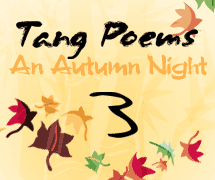This is the lesson attached to the Chinese learning game Tang Poems 3. There are 3 games in the series, totalling 150 essential Chinese characters included in the HSK Beginning Mandarin (level 1)! Play the FREE version of the game or join us and get the full version!
HSK Beginning Level is the first level of the CLASSIC HSK exams. If you would rather study the NEW HSK exams, play the Song Poems game series.
subject 让 / 叫 person …
and are causative verbs. Causative verbs are used to cause people to do something. In English, those verbs are MAKE, LET, GET, etc.
and are both used mainly in spoken Chinese but is the most common one. Other causative verbs such as or are more formal and used in written Chinese.
Example
means both to call and to be called.
subject 叫 name
Example 我叫 Julie。 Wǒ jiào Julie. My name is Julie.
Example 我的猫叫 Sushi。Wǒde māo jiào Cocoa. My cat is called Cocoa.
Example 他叫你的名字。 Tā jiào nǐde míngzì. He called your name.
To ask somebody their full name, you must use what (full) name.
subject 叫 什么 名字?
Example 你叫什么名字?Nǐ jiào shénme míngzi? What's your name?
To ask somebody their family name only, you must use what (clan or family) name.
subject 贵姓?
Example 你贵姓?我姓张。 Nǐ guìxìng? Wǒ xìng Zhāng. What's your last name? My last name is Zhang.
